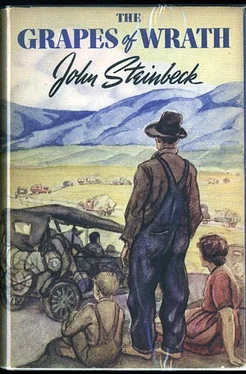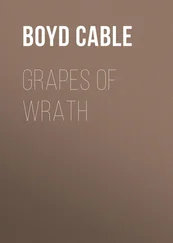John Steinbeck - The Grapes of Wrath
Здесь есть возможность читать онлайн «John Steinbeck - The Grapes of Wrath» весь текст электронной книги совершенно бесплатно (целиком полную версию без сокращений). В некоторых случаях можно слушать аудио, скачать через торрент в формате fb2 и присутствует краткое содержание. Город: New York, Год выпуска: 1939, Издательство: The Viking Press-James Lloyd, Жанр: Классическая проза, на английском языке. Описание произведения, (предисловие) а так же отзывы посетителей доступны на портале библиотеки ЛибКат.
- Название:The Grapes of Wrath
- Автор:
- Издательство:The Viking Press-James Lloyd
- Жанр:
- Год:1939
- Город:New York
- ISBN:нет данных
- Рейтинг книги:5 / 5. Голосов: 1
-
Избранное:Добавить в избранное
- Отзывы:
-
Ваша оценка:
- 100
- 1
- 2
- 3
- 4
- 5
The Grapes of Wrath: краткое содержание, описание и аннотация
Предлагаем к чтению аннотацию, описание, краткое содержание или предисловие (зависит от того, что написал сам автор книги «The Grapes of Wrath»). Если вы не нашли необходимую информацию о книге — напишите в комментариях, мы постараемся отыскать её.
The Grapes of Wrath — читать онлайн бесплатно полную книгу (весь текст) целиком
Ниже представлен текст книги, разбитый по страницам. Система сохранения места последней прочитанной страницы, позволяет с удобством читать онлайн бесплатно книгу «The Grapes of Wrath», без необходимости каждый раз заново искать на чём Вы остановились. Поставьте закладку, и сможете в любой момент перейти на страницу, на которой закончили чтение.
Интервал:
Закладка:
Black Hat raised his head, and his bristled chin showed in the light, and his stringy neck where the whiskers lay flat like fur. “Yeah!” he said bitterly. “You’ll do that. An’ I’m a two-bit man. You’ll take my job for twenty cents. An’ then I’ll git hungry an’ I’ll take my job back for fifteen. Yeah! You go right on an’ do her.”
“Well, what the hell can I do?” Pa demanded. “I can’t starve so’s you can get two bits.”
Black Hat dipped his head again, and his chin went into the shadow. “I dunno,” he said. “I jes’ dunno. It’s bad enough to work twelve hours a day an’ come out jes’ a little bit hungry, but we got to figure all a time, too. My kid ain’t gettin’ enough to eat. I can’t think all the time, goddamn it! It drives a man crazy.” The circle of men shifted their feet nervously.
TOM STOOD at the gate and watched the people coming in to the dance. A floodlight shone down into their faces. Willie Eaton said, “Jes’ keep your eyes open. I’m sendin’ Jule Vitela over. He’s half Cherokee. Nice fella. Keep your eyes open. An’ see if you can pick out the ones.”
“O.K.,” said Tom. He watched the farm families come in, the girls with braided hair and the boys polished for the dance. Jule came and stood beside him.
“I’m with you,” he said.
Tom looked at the hawk nose and the high brown cheek bones and the slender receding chin. “They says you’re half Injun. You look all Injun to me.”
“No,” said Jule. “Jes’ half. Wisht I was a full-blood. I’d have my lan’ on the reservation. Them full-bloods got it pretty nice, some of ’em.”
“Look a them people,” Tom said.
The guests were moving in through the gateway, families from the farms, migrants from the ditch camps. Children straining to be free and quiet parents holding them back.
Jule said, “These here dances done funny things. Our people got nothing, but jes’ because they can ast their frien’s to come here to the dance, sets ’em up an’ makes ’em proud. An’ the folks respects ’em ’count of these here dances. Fella got a little place where I was a-workin’. He come to a dance here. I ast him myself, an’ he come. Says we got the only decent dance in the county, where a man can take his girls an’ his wife. Hey! Look.”
Three young men were coming through the gate—young working men in jeans. They walked close together. The guard at the gate questioned them, and they answered and passed through.
“Look at ’em careful,” Jule said. He moved to the guard. “Who ast them three?” he asked.
“Fella named Jackson, Unit Four.”
Jule came back to Tom. “I think them’s our fellas.”
“How ya know?”
“I dunno how. Jes’ got a feelin’. They’re kinda scared. Foller ’em an’ tell Willie to look ’em over, an’ tell Willie to check with Jackson, Unit Four. Get him to see if they’re all right. I’ll stay here.”
Tom strolled after the three young men. They moved toward the dance floor and took their positions quietly on the edge of the crowd. Tom saw Willie near the band and signaled him.
“What cha want?” Willie asked.
“Them three—see—there?”
“Yeah.”
“They say a fella name’ Jackson, Unit Four, ast ’em.”
Willie craned his neck and saw Huston and called him over. “Them three fellas,” he said. “We better get Jackson, Unit Four, an’ see if he ast ’em.”
Huston turned on his heel and walked away; and in a few moments he was back with a lean and bony Kansan. “This here’s Jackson,” Huston said. “Look, Jackson see them three young fellas—?”
“Yeah.”
“Well, did you ast ’em?”
“No.”
“Ever see ’em before?”
Jackson peered at them. “Sure. Worked at Gregorio’s with ’em.”
“So they knowed your name.”
“Sure. I worked right beside ’em.”
“Awright,” Huston said. “Don’t you go near ’em. We ain’t gonna th’ow ’em out if they’re nice. Thanks, Mr. Jackson.”
“Good work,” he said to Tom. “I guess them’s the fellas.”
“Jule picked ’em out,” said Tom.
“Hell, no wonder,” said Willie. “His Injun blood smelled ’em. Well, I’ll point ’em out to the boys.”
A sixteen-year-old boy came running through the crowd. He stopped, panting, in front of Huston. “Mista Huston,” he said. “I been like you said. They’s a car with six men parked down by the euc’lyptus trees, an’ they’s one with four men up that north-side road. I ast ’em for a match. They got guns. I seen ’em.”
Huston’s eyes grew hard and cruel. “Willie,” he said, “you sure you got ever’thing ready?” Willie grinned happily. “Sure. have, Mr. Huston. Ain’t gonna be no trouble.”
“Well, don’t hurt ’em. ’Member now. If you kin, quiet an’ nice, I kinda like to see ’em. Be in my tent.”
“I’ll see what we kin do,” said Willie. Dancing had not formally started, but now Willie climbed onto the platform. “Choose up your squares,” he called. The music stopped. Boys and girls, young men and women, ran about until eight squares were ready on the big floor, ready and waiting. The girls held their hands in front of them and squirmed their fingers. The boys tapped their feet restlessly. Around the floor the old folks sat, smiling slightly, holding the children back from the floor. And in the distance the Jesus-lovers sat with hard condemning faces and watched the sin.
Ma and Rose of Sharon sat on a bench and watched. And as each boy asked Rose of Sharon as partner, Ma said, “No, she ain’t well.” And Rose of Sharon blushed and her eyes were bright.
The caller stepped to the middle of the floor and held up his hands. “All ready? Then let her go!”
The music snarled out “Chicken Reel,” shrill and clear, fiddle skirling, harmonicas nasal and sharp, and the guitars booming on the bass strings. The caller named the turns, the squares moved. And they danced forward and back, hands ’round, swing your lady. The caller, in a frenzy, tapped his feet, strutted back and forth, went through the figures as he called them.
“Swing your ladies an’ a dol ce do. Join hans’ roun’ an’ away we go.” The music rose and fell, and the moving shoes beating in time on the platform sounded like drums. “Swing to the right an a swing to lef’; break, now—break—back to—back,” the caller sang the high vibrant monotone. Now the girls’ hair lost the careful combing. Now perspiration stood out on the foreheads of the boys. Now the experts showed the tricky inter-steps. And the old people on the edge of the floor took up the rhythm, patted their hands softly, and tapped their feet; and they smiled gently and then caught one another’s eyes and nodded.
Ma leaned her head close to Rose of Sharon’s ear. “Maybe you wouldn’ think it, but your Pa was as nice a dancer as I ever seen, when he was young.” And Ma smiled. “Makes me think of ol’ times,” she said. And on the faces of the watchers the smiles were of old times.
“Up near Muskogee twenty years ago, they was a blin’ man with a fiddle—”
“I seen a fella oncet could slap his heels four times in one jump.”
“Swedes up in Dakota—know what they do sometimes? Put pepper on the floor. Gits up the ladies’ skirts an’ makes ’em purty lively—lively as a filly in season. Swedes do that sometimes.”
In the distance the Jesus-lovers watched their restive children. “Look on sin,” they said. “Them folks is ridin’ to hell on a poker. It’s a shame the godly got to see it.” And their children were silent and nervous.
“One more roun’ an’ then a little res’,” the caller chanted. “Hit her hard, ’cause we’re gonna stop soon.” And the girls were damp and flushed, and they danced with open mouths and serious reverent faces, and the boys flung back their long hair and pranced, pointed their toes, and clicked their heels. In and out the squares moved, crossing, backing, whirling, and the music shrilled.
Читать дальшеИнтервал:
Закладка:
Похожие книги на «The Grapes of Wrath»
Представляем Вашему вниманию похожие книги на «The Grapes of Wrath» списком для выбора. Мы отобрали схожую по названию и смыслу литературу в надежде предоставить читателям больше вариантов отыскать новые, интересные, ещё непрочитанные произведения.
Обсуждение, отзывы о книге «The Grapes of Wrath» и просто собственные мнения читателей. Оставьте ваши комментарии, напишите, что Вы думаете о произведении, его смысле или главных героях. Укажите что конкретно понравилось, а что нет, и почему Вы так считаете.











